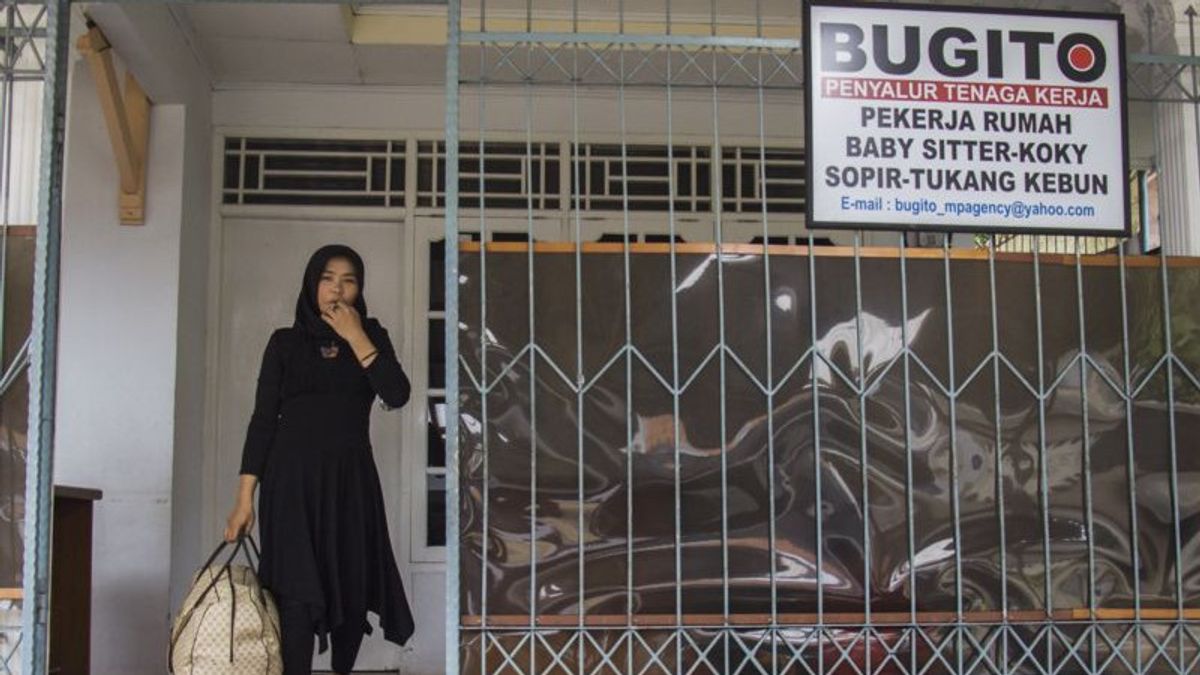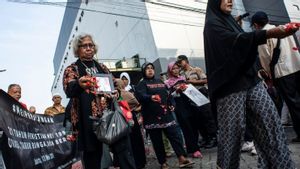JAKARTA – Even though there is a Regulation of the Minister of Manpower (Permenaker) Number 2 of 2015, domestic workers are in fact still considered as 'Domestic Helpers' not as 'Domestic Workers'. This is because according to a higher regulation, namely Law No. 13 of 2003 concerning Manpower, domestic workers are not yet included in the category of formal work.
Thus, according to the Coordinator of the National Network for Advocacy for Domestic Workers (Jala PRT) Lita Anggraini, the existence of domestic workers seems to be only a complement without any protection. Often regarded as second-class citizens.
There are no clear working hours. In fact, there are domestic workers who work full-time for 16 hours per day. They have to stand by whenever the employer needs them.
"It's all up to the employer. If the employer is wise, that's fine, but if not, domestic workers are like forced labor. In fact, they are vulnerable to humiliation and harassment, at least arbitrary actions from their employers or dealers," she told VOI, Thursday (19/1).
Jala PRT noted that there were 2,637 cases of violence, both physical and psychological, experienced by domestic workers during the 2017-2022 period. Such as sexual harassment, humiliation, insults, deductions from wages due to illness, wages not paid for months, wages arbitrarily deducted by dealers, non-payment of THR, and others.

That is why, said Lita, her party continues to urge the government to create a legal umbrella to protect domestic workers. However, domestic workers are workers who have an important role in helping the continuity of human life, from the family to the state level.
Domestic workers are a fundamental part of the movement of the activities of millions of households in line with the increasing demand for the needs of families in urban and rural areas to do household work in care and maintenance and household services.
One of the greatest for caring for children. The work of a domestic worker allows household members to carry out various activities in various fields of the economy, law, culture, and politics anywhere, enabling employer household members to have careers, skills, and other accesses.
"If there are no domestic workers, maybe we also won't be able to focus on our activities. Neither will Mr. President's children be able to work if there is no one to help around the house. So, their role in the family is very important,“ she said.
A number of domestic workers who become migrant workers abroad, such as Malaysia, Saudi Arabia, Singapore, have been recognized as workers in the formal sector. They are proud of their profession. Meanwhile in her own country, said Lita, "PRT is still considered a lowly profession and tends to be looked down upon."
Need Struggle
Based on a survey by the ILO and the University of Indonesia in 2015, the number of domestic workers in Indonesia has reached more than 4 million people. More than 70 percent are women aged 20-35 people. The estimate for 2022, according to Lita, will be 5 million people.
"So, for the sake of humanity and inclusivity, immediately materialize the Household Protection Act, ratify ILO conventions 189 and 190," said Lita.
International Labor Organization (ILO) Convention 189 of 16 June 2011 established fundamental rights and principles, and required States to take a series of steps with the aim of making decent work a reality for domestic workers.
While ILO 190 on 10 June 2019 resulted in an agreement on eliminating violence and harassment in the world of work. That is the best way to build a healthy work culture, a work culture of mutual respect, and build the human dignity of workers with gender equality.
Until 2022, 35 countries have ratified the ILO convention, including Uruguay, Argentina, Portugal, Panama, Germany, Italy, and the Philippines.

Meanwhile in Indonesia, according to the Coordinator of the Civil Coalition for the Domestic Workers Act Eva Kusuma Sundari, the process still requires struggle. Many organizations have supported the bill on domestic workers to be passed into law soon so that the rules can be more binding, and not limited to ministerial regulations.
The Presidential Staff Office (KSP), in August 2022, has also formed a Task Force on the PPRT Bill which consists of cross ministries to prepare for discussions on the PPRT Bill with the DPR.
In fact, President Joko Widodo (Jokowi) on January 18 2023 has stated that he will push for the adoption of the Domestic Workers Act to be expedited. The President has ordered Menkumham and Menaker to immediately coordinate and consult with the DPR and all stakeholders.
Eva appreciated, “At least there is a bright spot. There has been a direct statement from the President.”
She hopes the leadership of the DPR will also give a good response. Because, according to Eva, since the 2014-2019 period, the draft Bill on Domestic Workers has actually been included in the Prolegnas list. In fact, it is included in the priority bills for 2020, 2021, and 2022.
"It was drafted at the Baleg Plenary on July 1 2020 to be brought to the DPR RI plenary as a DPR Initiative Bill. However, until now, the Bamus and the leadership of the DPR are still holding them," Eva told VOI, Thursday (19/1).
Scope of domestic workers
In the draft PPRT Bill, the scope of work for domestic workers includes:
- Cooking group;
- Workgroup washing clothes;
- house cleaning group;
- The work group cleans the yard and/or garden where the Employer lives;
- Child care work group;
- The work group looks after sick people, and/or people with special needs;
- Driving work group;
- housekeeping group; and/or
- Pet workgroup
Overall, the PPRT Bill regulates various matters, ranging from types of recruitment, working hours, work relations, education and training, settlement of employment disputes, to rights and obligations, both for employers and domestic workers.

Article 11 of the draft Law on Domestic Workers states that domestic workers have the right to:
- Carry out worship in accordance with the religion and beliefs they adhere to;
- Work humane hours;
- Get Leave in accordance with the agreement between the domestic worker and the Employer;
- Get wages and holiday allowances in accordance with the agreement with the Employer;
- Obtain health social security as a beneficiary of contribution assistance;
- Get employment social security in accordance with the agreement with the employer; and
- Terminate the Employment Relations if there is a violation of the Employment Agreement.
As for wages, the PPRT Bill leaves the setting of the wage rate to the employer. So, based on the agreement between the domestic worker and the employer, not referring to regional-provincial minimum wages,
“We adopted the initial version from ILO 189 concerning domestic workers. So there is a minimum wage, minimum hours of work, now we will reduce everything based on negotiations. That is the 78th amended version, the important thing is that there is recognition first," said the former member of the Republic of Indonesia DPR for the 2014-2019 period.
In fact, domestic workers have the right to receive recognition and treatment as workers in accordance with human dignity. For protection and guarantees for the fulfillment of the basic rights of domestic workers, and for preventing discrimination and violence.
The Coordinator of Jala PRT, Lita also hopes, "It's time for everything to change, the country and we must value domestic workers more, no longer as household helpers or assistants, but workers."
"It's enough for the laundry to be squeezed out, not the domestic workers," said Lita emphatically.
VOIR éGALEMENT:
The English, Chinese, Japanese, Arabic, and French versions are automatically generated by the AI. So there may still be inaccuracies in translating, please always see Indonesian as our main language. (system supported by DigitalSiber.id)













